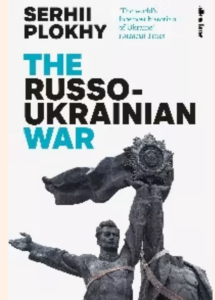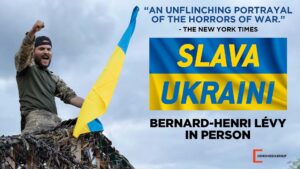One question dominates debates between American and European leaders, and it’s one that Ukraine views as existential. It is also, for now, unanswerable: When will Ukraine join NATO? Foreign Policy’s Robbie Gramer writes.
Any durable settlement to end the war in Ukraine will need to include much stronger security guarantees for Ukraine, says Stanford University’s Francis Fukuyama. Mere verbal commitments from Western powers will not be sufficient, he writes for American Purpose:
They made such commitments in the Budapest Memorandum in 1994 whereby Ukraine agreed to give up its nuclear weapons in exchange promises to respect the country’s territorial integrity. These commitments were honored neither by the Russians nor by Ukraine’s Western backers. Today, nothing short of membership in NATO with its Article Five guarantee would be sufficient to deter a future Russian resumption of the current war.
 Ukrainian President Volodymyr Zelensky gave a speech on Monday to the Copenhagen Democracy Summit, addressing the conference virtually (above) before making a surprise visit to the UK.
Ukrainian President Volodymyr Zelensky gave a speech on Monday to the Copenhagen Democracy Summit, addressing the conference virtually (above) before making a surprise visit to the UK.
The strategic case for including Ukraine in the West goes to the core of the conflict, notes Ivo Daalder, former U.S. ambassador to NATO and president of the Chicago Council on Global Affairs. Without Ukraine’s integration, Putin — and whomever succeeds him — will continue to believe they have a chance to control it, he writes for POLITICO.
Indeed, by defeating him militarily in Ukraine, as well as by integrating the country into the West, Russia’s strategic failure will be realized. And this will help restore a degree of order — demonstrating that aggression doesn’t pay — as well as send a clear signal to Moscow that there’s no future prospect where renewed aggression would be successful, adds Daalder, who traveled to Ukraine as part of a GLOBSEC-organized delegation.
Russia’s aims have rebounded against it. And rather than hastening the emergence of a multipolar world, the conflict has reaffirmed American leadership of a reunited west and underscored Russia’s weakness relative to China, now its main sponsor, The FT’s Ben Hall notes.
 Ukraine is “terminating the era of Russian dominance in a good part of eastern Europe and challenging Moscow’s claim to primacy in the rest of the post-Soviet space,” Harvard’s Serhii Plokhy writes in his latest book, The Russo-Ukrainian War….
Ukraine is “terminating the era of Russian dominance in a good part of eastern Europe and challenging Moscow’s claim to primacy in the rest of the post-Soviet space,” Harvard’s Serhii Plokhy writes in his latest book, The Russo-Ukrainian War….
….. a compelling rejoinder to those who, reductively, still blame Putin’s war of aggression on western provocations, including the enlargement of Nato to post-Soviet states. It is also an expression of faith in Ukrainian resilience. In its struggle for survival, Ukraine has never been more united or certain of its identity, Plokhy says. Ukraine is not just the victim in his account. It has agency. Its resistance will force Russia to part ways with its tsarist imperial past and abandon the “anachronistic” notion of a Russian nation consisting of Ukrainians and Belarusians as well as Russians.
“The fact that Ukraine can be a democracy… presents a threat to the authoritarian regimes in Moscow and Minsk of the sort that NATO would never actually present,” Plokhy tells Democracy Paradox:
Russia remains a nuclear superpower while becoming a second-rate state, certainly economically, but also in terms of its political standing. We have a leader for whom there is an arrest warrant issued by international organizations. It’s not something that really helps political standing of any country, Russia or otherwise. You have an army that was proud to be called the second most powerful army in the world and in Ukraine, they’re saying now only half-jokingly that it turned out to be the second most powerful army in Ukraine.
 For anyone seeking to make sense of Russia’s war in Ukraine, viewing French public intellectual Bernard Henri-Levy’s new feature-length documentary “Slava Ukraini” (“Glory to Ukraine”) isn’t an option. It’s a must. A gritty, intense, and probing examination of the impact of the war, it offers what is surely the ultimate antidote to Ukraine fatigue, according to Melinda Haring and Jacob Heilbrunn, non-resident senior fellows at the Atlantic Council’s Eurasia Center:
For anyone seeking to make sense of Russia’s war in Ukraine, viewing French public intellectual Bernard Henri-Levy’s new feature-length documentary “Slava Ukraini” (“Glory to Ukraine”) isn’t an option. It’s a must. A gritty, intense, and probing examination of the impact of the war, it offers what is surely the ultimate antidote to Ukraine fatigue, according to Melinda Haring and Jacob Heilbrunn, non-resident senior fellows at the Atlantic Council’s Eurasia Center:
The film, which carefully traces Henri-Levy’s journey across Ukraine, is about far more than jerky shots of the Frenchman and his crew dodging bullets and drone attacks. It is about Ukraine’s defiance of Putin’s attempt not simply to wage a war of territorial conquest, but to efface the idea of Ukrainian nationhood itself.
“If I dare to give a certain logic to this crazy war, it is in the logic of the denial of Ukrainian identity,” he says. “This barbarity matches the logic of denying the very existence of Ukraine.”
I wonder what tomorrow’s episode might be about… If only there was a way to hear the whole thing now rather than waiting….https://t.co/bcUH1rglDZ
— Democracy Paradox (@DemParadox) May 15, 2023







